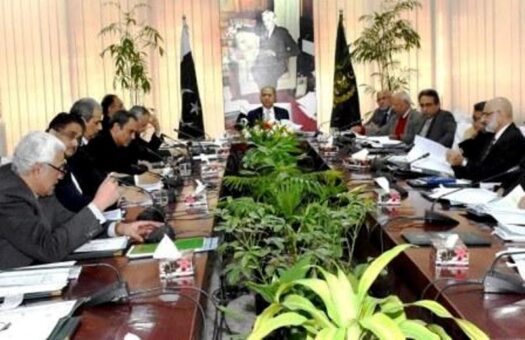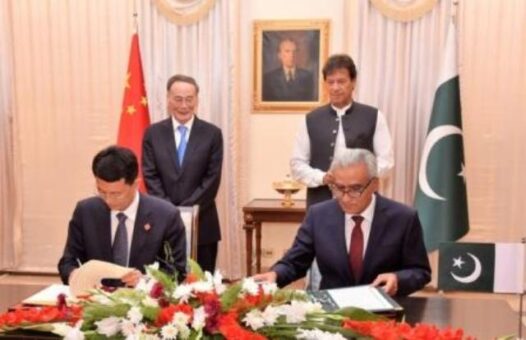ISLAMABAD: The National Economic Council (NEC) in its meeting held on Wednesday approved GDP target at 4 percent for fiscal year 2019/2020.
Prime Minister Imran Khan chaired the NEC meeting at the PM Office.
The meeting reviewed Annual Plan 2018/2019 and the proposed Annual Plan 2019/2020.
The meeting approved GDP growth target of 4 percent along with sectoral growth of agriculture (3.5 percent) industry (2.2 percent) and services sector (4.8 percent) for financial year 2019/2020.
The meeting reviewed draft 12th Five Year Plan (2018-2023). It was informed that main themes of the 12th Five Year Plan include balanced and equitable regional development; sustainable, inclusive, job-creating export-led growth; resource mobilization and improving governance; improving social protection; ensuring food and water security, enhancing connectivity, promoting knowledge economy and Clean and Green Pakistan.
The NEC approved 12th Five Year Plan (2018-2023), in principle. It was decided that the plan will be further fine-tuned, especially its implementation mechanism, in consultation with all stakeholders.
The meeting reviewed Public Sector Development Programme (PSDP) 2018-2019 and the proposed PSDP 2019-2020.
It was informed that PSDP 2019-2020 focuses on new initiatives in the field of agriculture, information technology, higher education, science and technology and technical education and training.
The meeting was informed that targeted interventions will be made in the less developed districts of the country to bring them at par with other parts of the country for regional equalization.
Ten billion Tsunami Program, Prime Minister’s Youth Skill Development Initiative, rehabilitation of affected population residing along Line of Control, construction of Gilgit-Shandur-Chitral Road and improvement of sewerage and sanitation system of Gilgit, and development of merged districts of Khyber Pakhtunkhwa are some of the major priority areas of Public Sector Development Programme (PSDP) 2019-2020.
The meeting approved National Development Outlay 2019-2020 amounting to Rs1.837 trillion including Federal PSDP and Provincial ADPs.
Progress Report of CDWP and ECNEC from 1st April 2018 to March 31, 2019 was laid before the National Economic Council. The NEC confirmed extension in powers of Special Forum for Rehabilitation and Reconstruction in FATA (erstwhile) till December 2019.
The Special Forum, under the Chairmanship of Commander 11 Corps, was established by the NEC on May 30, 2016 for a period of two years for fast track implementation mechanism for Rehabilitation and Reconstruction in erstwhile FATA.
The meeting approved establishment of Islamabad Development Working Party headed by the Chief Commissioner ICT including representatives from Ministries of Finance, Planning and other concerned offices.
The IDWP will be allowed to approve development project up to Rs60 million. The NEC approved procedure for approval of Program for Results (PforR), Development Policy Credits (DPCs) and Financial Intermediation Programs (FIPs).
The Prime Minister during the meeting said that the country was facing unprecedented economic crisis. He said that joint efforts of the Federal Government and the Provincial Governments were needed to overcome the present economic crisis.
The Prime Minister said that the Government has introduced Local Government systems in Punjab and Khyber Pkahtunkhwa to ensure empowerment of the people at grass root level and to afford them an opportunity to play their part in their developmental process.
The Prime Minister reiterated his call to the provinces to allocate necessary financial resources, as per the commitments made earlier, for the development of erstwhile FATA.
The meeting was attended by Adviser Finance Dr. Abdul Hafeez Sheikh, Planning Minister Makhdoom Khusru Bakhtiar, Adviser Commerce Abdul Razzak Dawood, Governor KP Shah Farman, Chief Minister Punjab Sardar Usman Buzdar, CM Sindh Syed Murad Ali Shah, CM Khyber Pakhtunkhwa Mehmood Khan, CM Balochistan Jam Kamal Khan, Finance Minister Punjab Makhdoom Hashim Jawan Bakht, Nisar Ahmed Khuhro, Ms. Naheed S. Durrani, Finance Minister KP Taimur Saleem Khagra, Jan Muhammad Jamali, PM Azad Jammu & Kashmir Raja Farooq Haider, Chief Minister Gilgit-Baltistan Hafiz Hafiz-ur-Rehman and others.





